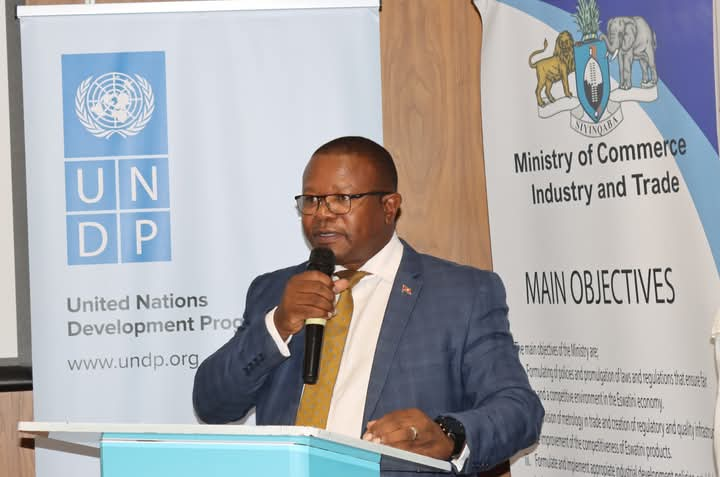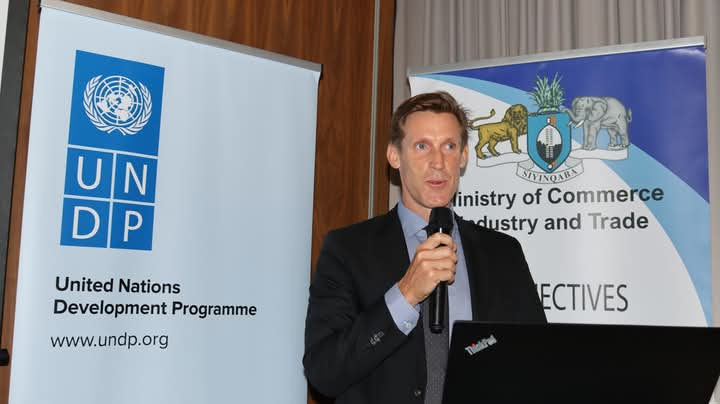
By Phiwa Sikhondze
The Minister of Commerce, Industry, and Trade, Manqoba Khumalo has officially launched the National Micro, Small, and Medium Enterprises (MSME) Policy 2025, signaling a renewed commitment to fostering entrepreneurship, job creation, and economic diversification.
Speaking at the launch event, Khumalo emphasized the policy’s role in strengthening Eswatini’s entrepreneurial ecosystem by addressing key challenges, improving market access, and leveraging new opportunities for MSMEs.
He noted that MSMEs are crucial to achieving industrialization, job creation, and sustainable economic development, aligning with global frameworks such as the United Nations Sustainable Development Goals (SDGs).
“The revised MSME Policy builds on the 2018 framework, addressing key challenges while leveraging new opportunities to empower our entrepreneurs and strengthen the national economy,” Khumalo stated.
“We must work together to transform MSMEs from predominantly informal enterprises into structured, growth-oriented businesses capable of competing locally and globally, thereby creating jobs and driving exports.”
The policy is anchored on four key strategic pillars aimed at providing long-term support for MSMEs:
- Creating a Conducive Enterprise Environment – Ensuring regulatory frameworks support small businesses while reducing bureaucratic barriers to entry.
- Business Development and Promotion – Enhancing training, mentorship, and business incubation programs to build capacity among entrepreneurs.
- Financing and Market Linkages – Facilitating access to funding opportunities and ensuring MSMEs are linked to viable markets.
- Infrastructure and Technology Support – Promoting investment in digital tools and physical infrastructure to aid business operations.
The policy aligns with SDG 9 (Industry, Innovation, and Infrastructure) and SDG 8 (Decent Work and Economic Growth) by fostering innovation, increasing financial access for small businesses, and supporting economic inclusion.
The Citizen Economic Empowerment Act complements the MSME policy by ensuring that Indigenous businesses receive preferential procurement opportunities. The Act aims to uplift local entrepreneurs, promoting inclusivity in economic participation.
“Again, we must work together to unlock the potential of MSMEs, reduce unemployment, and enhance national income through increased productivity,” Khumalo explained.
The United Nations Development Programme (UNDP) played a pivotal role in the policy’s formulation, providing technical expertise and strategic guidance. Henrik Franklin, UNDP Resident Representative, highlighted the importance of private sector development in driving sustainable economic growth.
“A vibrant MSME sector contributes to economic resilience, innovation, and job creation,” Franklin stated. “This policy underscores our joint commitment to nurturing the growth of MSMEs, recognizing their critical role in driving economic diversification, job creation, and innovation. By reducing reliance on a limited number of industries, we can build a more resilient economic structure capable of withstanding external shocks. This diversification is significant for Eswatini as we seek to maximize the benefits of the African Continental Free Trade Area (AfCFTA) and expand access to domestic, regional, and international markets.”
The successful implementation of the MSME Policy 2025 requires collaborative efforts from government agencies, private sector players, financial institutions, and development partners.

Khumalo urged all stakeholders to support the initiative by fostering a business-friendly environment and ensuring that MSMEs are prioritized in economic development plans.
“This policy is a call to action,” he concluded. “Let us commit to nurturing a dynamic MSME sector that fosters innovation, enhances competitiveness, and contributes meaningfully to our national development goals.”
